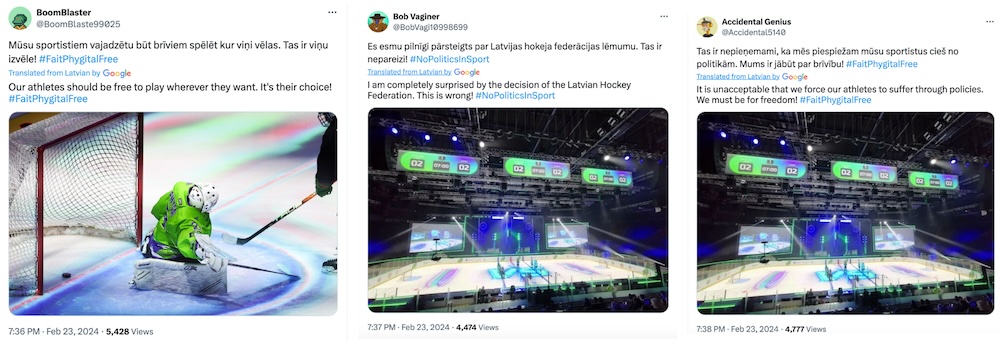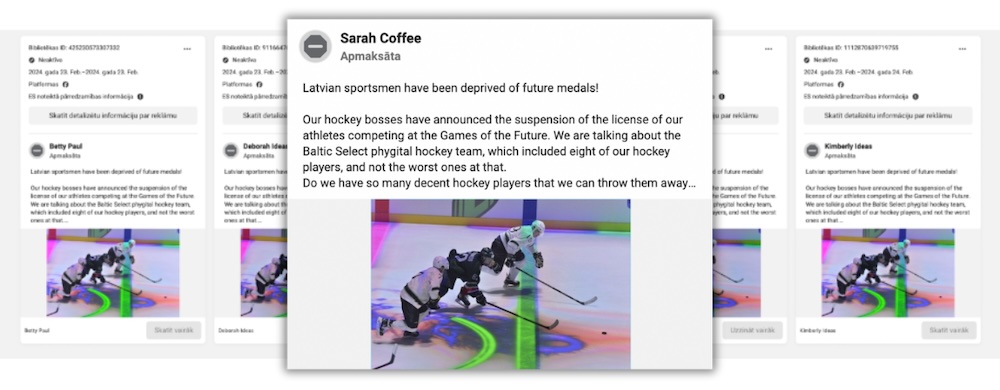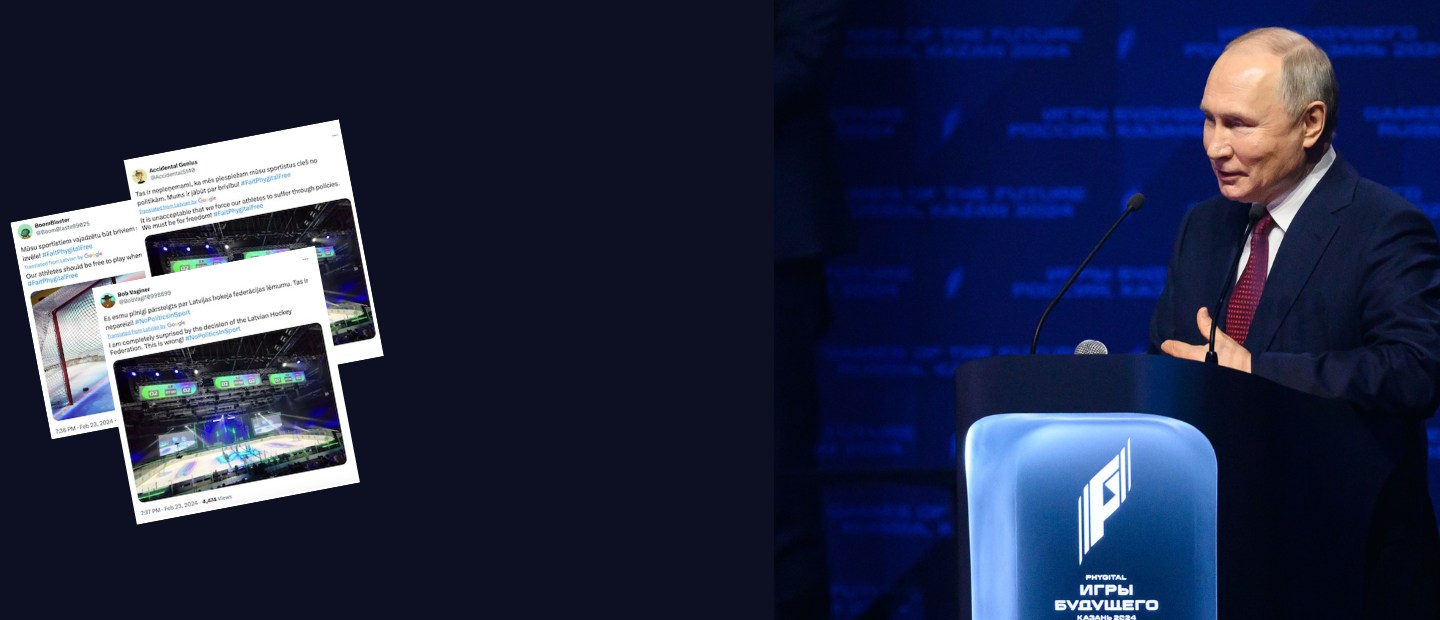Latvia’s social media users recently encountered an unprecedented attack of bots. During it thousands of accounts suddenly started to speak rudimentary Latvian and defend hockey players who had played tournament in Russia despite the ban. This was the first operation of such scale in one of the Baltic languages and has led to speculation that it could be a test-run before European Parliament elections.
The wave of bot activity on X (formerly Twitter) kicked off a day after Latvian social networks erupted in outrage at the hockey players who had participated in a tournament in Kazan, Russia, in the middle of February, 2024. Latvia has banned its national teams from participation in any competition where Russian and Belarussian teams are taking part.
In this case the outrage was even bigger as the hybrid event where part of the tournament takes place in ice ring, and another part via online games, was opened by Russia’s president Vladimir Putin whom majority of Latvians consider a war criminal.
Tournament’s “Games Of The Future” website states that eleven players were part of Baltic Select team. Latvian fans were upset to see the country’s flag displayed at the opening of games which they see as Russia’s propaganda. The Latvian Ice Hockey Federation suspended the licenses of two players.
Bots swiftly joined the conversation in the late afternoon of February 23. Over the next two days, thousands of bot messages criticized the federation’s decision as “unprofessional” and asked to “respect players’ choices.”

Screenshots of bot’s posts. Source: Re:Baltica
These messages were accompanied by hashtags #NoPoliticsInSport, #FairSport, #westandwithBalticSelect, and others.
NATO Strategic Communications Centre of Excellence, which is based in Riga, estimated that over thousand unique bots were tweeting these messages in Latvian.
“We have been analyzing so-called ‘robotrolling’ on Twitter for seven years, and this is the first time we have observed such a massive campaign in the Latvian language,” Sārts, the head of NATO StratCom Center said to Re:Baltica.
Researchers from the Bot Blocker (antibot4navalny) project, which focuses on monitoring Russian bot operations on X, reached a similar conclusion. They estimated that almost 200 000 bot retweets were made over two days, reaching nearly 800 000 impressions.
The representative of Bot Blocker project, who provided Re:Baltica with the methodology of their estimates, said that “very likely” pro-Kremlin Doppelganger bot network was behind this operation.
“This is the first time Doppelganger has targeted Latvia, and it is the second largest episode in terms of effort and reach achieved on Twitter since October 2023, when we started monitoring the network,” representative of Bot Blocker told Re:Baltica.
The first massive operation had been retweeting the memes in which Putin and China’s leader are pictured on New Year’s greeting cards wishing happy new year and hinting at a new world order. The cards were distributed on Dec 31, 2023, and resulted in 879 000 views and 209 000 retweets.

Screenshots of posts with the New Year’s greeting cards. Source: Re:Baltica
Cheap shot
“I cannot comment on who was behind this hockey campaign, but whoever it was, the campaign was cheap,” Jānis Sārts said to Re:Baltica.
StratCom regularly conducts experiments for research purposes by purchasing bots for X to analyze how easily specific messages can be spread. Recent analysis indicates that pro-Kremlin accounts are employing more advanced techniques, such as benefiting from the X paid verification system (“blue checks”), which allows them to gain more reach and earn from ads.
“If this is their level, then we are safe,” Sārts remarked with a hint of irony.
He sees two potential reasons why bot campaign was activated – either whitewashing and promoting games inaugurated by Putin, or test run before European Parliament elections in June, 2024.
Rihards Bambals, the head of the strategic communication unit at the State Chancellery, shares Sārt’s opinion. “This can be seen as a test of our state institutions and society. It’s an examination to see how we react, how quickly, through which channels, and with what messages,” Bambals told Re:Baltica.
A week after “hockey bot” event most of the accounts which were established in December and participated in the campaign had remained active, Re:Baltica observed. However, the new accounts, established in February and used primarily for retweets, were marked as “restricted”. Bot Blocker’s previous findings show that these accounts eventually get suspended.
Doppelganger constantly tests X systems which are meant to catch abuse and inauthentic behavior. For example, noticing that posting bot tweets at the same speed in English from the US or EU country, the accounts located in Europe get suspended faster, Doppelganger in the EU started posting fewer tweets in the same time span. As a result, it took more time for the X abuse-catching system to identify them.
“From this we can conclude that X treats different languages/target countries differently regarding abuse protection. Second, the bad actors learn from experience and tailor its operation for each language individually,” Bot Blocker stated.
“Remove these idiots“
Shortly after the surge of bots on X, 21 pages sharing the same line emerged on Facebook. All posts were paid – promoted, targeting citizens of Latvia.

Screenshots of posts in English. Source: Re:Baltica
This time it was in English. “Latvian sportsmen have been deprived of future medals!” the authors of the posts cried and called to “remove these idiots from hockey management” who had suspended players’ licenses in Latvia.
The post included a link to a petition supporting the suspended players. It was created by Brazilian Renato Sa Neto who had participated in the same tournament as member of “R10 Team”. Re:Baltica reached out to him via X and asked for e-mail address to send questions. After receiving them he went silent.

Facebook post targeting Latvians included link to a petition in support of suspended hockey players. The petition was created by Renato Sa Neto, who, according to the media, was participating in the games in Kazan. Source: dspkazan; openpetition.com
Facebook ad library shows that the message targeted Latvians aged 18-65, with each post reaching an average of 20 000 individuals. However, FB quickly identified the behavior as inauthentic and it led to the deactivation of the pages.
Facebook declined to provide further comment to Re:Baltica.
Requesting signatures for petitions to engage larger audience is a common tactic employed by the Doppelganger network.
The term “Doppelganger” for this pro-Kremlin bot network was coined by international NGO exposing disinformation campaigns – the EU Disinfo Lab in 2022. They exposed the use of multiple “clones” of authentic media to target users with fake articles, videos, and polls.
According to the META report, among the “fake” media pages was also the most popular Baltic news site – Delfi. As a result of investigation META took down a network of over 60 websites impersonating legitimate news organizations. It revealed that the network was controlled by the Russian IT companies National Technologies and Social Design Agency which are now under EU sanctions. The ultimate owner of National Technologies is Rostec — Russia’s state-owned defense conglomerate headed by former KGB agent Sergey Chemezov, a close friend of Vladimir Putin, as reported by independent Russian media, The Insider.
Hockey bots network which was targeting Latvians remains active. A week later another wave of posts was launched. This time it was to support the same sports games in Kazan. According to Bot Blocker, the reach of this wave was 780 000 views.

Screenshots of bot’s posts. Source: Re:Baltica
Sārts cautions against underestimating the significance of these campaigns. “The recent events in Latvia may seem primitive, but they represent just the tip of the iceberg,” he said. “The next phase could involve more sophisticated tactics, such as integrated ChatGPT, making tweets appear even more authentic. We must remain vigilant.”
Cover photo: Sandra.World / Wikimedia Commons, CC0
This article is part of Re:Baltica’s quarterly reviews about the disinformation trends in the Baltics.

This article was originally published on en.rebaltica.lv.
Inga Spriņģe is an award-winning investigative journalist, former broadcaster, lecturer, and one of two founders of The Baltic Center for Investigative Journalism Re:Baltica based in Latvia. Springe is a member of the major international investigative journalism networks, ICIJ and OCCRP. She covers topics ranging from propaganda and disinformation to social justice.







